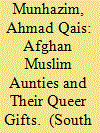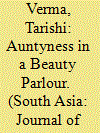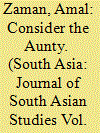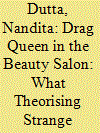|
|
|
Sort Order |
|
|
|
Items / Page
|
|
|
|
|
|
|
| Srl | Item |
| 1 |
ID:
191710


|
|
|
|
|
| Summary/Abstract |
Aunties in South Asia are known for their love, gossip and watchful eye. They are important actors in kinship circles, social fabrics and transgressive possibilities. As a murat/queer person, I always featured in aunties’ gossip and remained under their watchful eye whether I danced, flirted with their sons or crossed boundaries. In discussions of queerness, we oftentimes forget those Muslim Afghan aunties who risk their lives and become armour for queer and trans kids and adults. Through the autoethnography of three Muslim Afghan aunties who each bestowed upon me a gift—a doll, sex education and heels—I situate aunties as central to queer world-making and survival in times of war (and, more broadly, states of emergency and conflict), and I argue that war inadvertently gives aunties the agency to rebel against the heteronormative and masculinist culture of war and create queer worlds for their kinship circles and beyond.
|
|
|
|
|
|
|
|
|
|
|
|
|
|
|
|
| 2 |
ID:
191708


|
|
|
|
|
| Summary/Abstract |
Interactive service work in various middle- and upper-class settings has created visible disparities between those who seek the work and those who provide it. In addition to beauty work, beauty parlours require emotional/affective work, widening the class gap between sellers and consumers by requiring further labour on the part of the worker. However, within the smaller beauty parlours existing in the by-lanes of larger Indian markets, there is the possibility of creating shared space through conversations and care through a mobilisation of ‘auntyness’. In this paper, I explore how the conversations in a New Delhi beauty parlour lead to the creation of aunties that challenges the limits of interactive service work and enables temporary communities of kinship and care that hinge upon the participants’ performances of the styles, affects and values associated with aunties.
|
|
|
|
|
|
|
|
|
|
|
|
|
|
|
|
| 3 |
ID:
191704


|
|
|
|
|
| Summary/Abstract |
This essay reads the aunties on the peripheries of Hanif Kureishi and Stephen Frear’s film, My Beautiful Laundrette (1985), as minor figures, enacting a methodological turn to the seemingly insignificant in analyses of South Asian culture and sexuality. I ask why the aunties’ desire feels so impossible, especially in a film centred on a Pakistani protagonist’s queer utopia. Both ubiquitous and precluded from a complexity of desire, representations of the Pakistani aunty suffer from a deficit of imagination. Aunties tend to be shown as middle-aged women who surveil and police their kin and have a neutered or absent sexuality, as the film’s paradigmatic figuration of the aunty exemplifies. This article argues that such creative constraint derives from the construction of female sexuality as deviance in South Asia, and then tries to look beyond these constraints. While asking what a more capacious imagining of the aunty and her desires might make possible, I offer parameters for reading sexuality in Pakistan and its diasporas by foregrounding deprivation of pleasure and choice.
|
|
|
|
|
|
|
|
|
|
|
|
|
|
|
|
| 4 |
ID:
191711


|
|
|
|
|
| Summary/Abstract |
LaWhore Vagistan, a South Asian drag queen, meets Noor, a South Asian beauty salon owner, in this essay to illustrate the kind of work diasporic aunties do for other migrant women. Aunties engage in aesthetic and emotional labour to build diasporic spaces of beauty and intimacy. The affective power of these spaces for migrant women and queer folks becomes legible at the intersections of gender, race and class. In this essay, I employ drag as a lens to understand the work of the diasporic beautician, putting into conversation two aunties who may seem antithetical to each other at first glance.
|
|
|
|
|
|
|
|
|
|
|
|
|
|
|
|
|
|
|
|
|